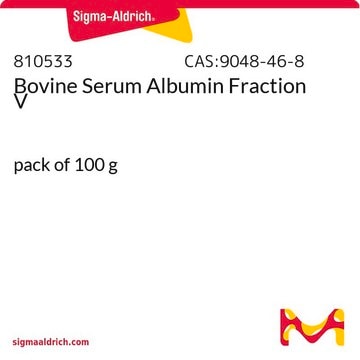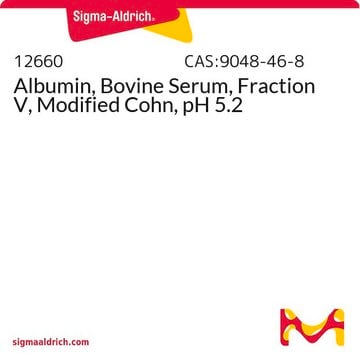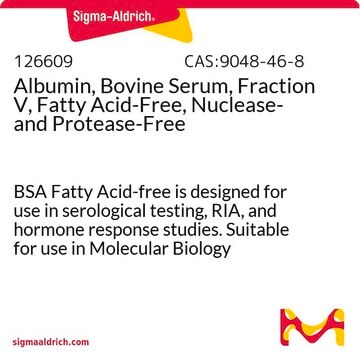1.12018
Albumin fraction V
(from bovine serum) for biochemistry
Sinonimo/i:
Albumin fraction V, Bovine serum albumin, Serum albumin
Autenticatiper visualizzare i prezzi riservati alla tua organizzazione & contrattuali
About This Item
Prodotti consigliati
Forma fisica
solid
pH
6.8-7.2 (20 °C, 1 g/L in H2O)
Solubilità
1 g/L
Densità bulk
150 kg/m3
Temperatura di conservazione
2-8°C
Descrizione generale
Bovine serum albumin (BSA) belongs to the serum albumin family with three domains and two sub-domains each. This globular, α-helical, non-glycosylated protein has 17-disulfide bonds.
Applicazioni
Albumin fraction V has been used:
- as a component of perfusion buffer for perfusion protocol for rodent organ perfusion
- as a blocking agent in western blot analysis
- as a nitrated protein standard to study the effects of antibodies against 3-nitrotyrosine and to characterize the binding and detection of nitrated proteins in one-sided and sandwich immunoassays
Azioni biochim/fisiol
Bovine Serum Albumin (BSA) is the chief component of cell culture media and also works as a blocking agent in enzyme-linked immunosorbent assay (ELISA). It is beneficial for embryonic stem cells (hESC) differentiation and assists the transport of drugs, hormones, and fatty acids.
Risultati analitici
Appearance (colour): slightly yellow
Appearance (description): leafs
Assay of protein (spectralphotometric; calc. on anhydrous substance): ≥ 97.0 %
Assay of Albumin (Agarose gel electrophoresis): ≥ 98.0 %
pH-value (1 %; sodium chloride solution c = 0.5 mol/ l): 6.8 - 7.2
K (Potassium): ≤ 0.02 %
Na (Sodium): ≤ 0.5 %
Mg (Magnesium): ≤ 0.01 %
Ca (Calcium): ≤ 0.05 %
Heavy metals (as lead): ≤ 0.001 %
Fats: ≤ 0.2 %
Decomposition products: not detectable
Water (according to Karl Fischer): ≤ 5.00 %
Ash (600 °C): ≤ 1 %
NADH Oxidase (NADH; pH 7.5; 25° C): not detectable
LDH (pyruvate; pH 7.5; 25° C): not detectable
Appearance (description): leafs
Assay of protein (spectralphotometric; calc. on anhydrous substance): ≥ 97.0 %
Assay of Albumin (Agarose gel electrophoresis): ≥ 98.0 %
pH-value (1 %; sodium chloride solution c = 0.5 mol/ l): 6.8 - 7.2
K (Potassium): ≤ 0.02 %
Na (Sodium): ≤ 0.5 %
Mg (Magnesium): ≤ 0.01 %
Ca (Calcium): ≤ 0.05 %
Heavy metals (as lead): ≤ 0.001 %
Fats: ≤ 0.2 %
Decomposition products: not detectable
Water (according to Karl Fischer): ≤ 5.00 %
Ash (600 °C): ≤ 1 %
NADH Oxidase (NADH; pH 7.5; 25° C): not detectable
LDH (pyruvate; pH 7.5; 25° C): not detectable
Codice della classe di stoccaggio
11 - Combustible Solids
Classe di pericolosità dell'acqua (WGK)
WGK 3
Punto d’infiammabilità (°F)
Not applicable
Punto d’infiammabilità (°C)
Not applicable
Certificati d'analisi (COA)
Cerca il Certificati d'analisi (COA) digitando il numero di lotto/batch corrispondente. I numeri di lotto o di batch sono stampati sull'etichetta dei prodotti dopo la parola ‘Lotto’ o ‘Batch’.
Possiedi già questo prodotto?
I documenti relativi ai prodotti acquistati recentemente sono disponibili nell’Archivio dei documenti.
I clienti hanno visto anche
Thomas Franze et al.
The Analyst, 129(7), 589-596 (2004-06-24)
Three monoclonal antibodies (mAb) and three polyclonal antibodies (pAb) have been characterized and compared with respect to their cross-reactivities and affinities for 3-nitrotyrosine, eight aromatic compounds with similar chemical structures, a peptide containing a single nitrotyrosine residue, and fourteen nitrated
Sebastian Ivens et al.
Brain : a journal of neurology, 130(Pt 2), 535-547 (2006-11-24)
It has long been recognized that insults to the cerebral cortex, such as trauma, ischaemia or infections, may result in the development of epilepsy, one of the most common neurological disorders. Human and animal studies have suggested that perturbations in
Holger Jungbluth et al.
Clinical oral investigations, 18(9), 2077-2086 (2014-02-08)
The aim of this series of studies was the development and validation of a new model for evaluation of dentinal hypersensitivity (DH) therapies. Roots from extracted human teeth were sealed with a flowable composite. In the cervical area, a 3-mm-wide
J L Lanciego et al.
Brain research. Brain research protocols, 2(4), 323-332 (1998-06-19)
The present report deals with a multiple tract-tracing procedure in non-human primates enabling the simultaneous visualization of retrogradely transported Fluoro-Gold (FG) and cholera toxin B subunit (CTB) in combination with anterogradely transported biotinylated dextran amine (BDA). Two issues have played
Charlotte Bayer Christiansen et al.
American journal of physiology. Gastrointestinal and liver physiology, 315(1), G53-G65 (2018-03-02)
The colonic epithelium harbors a large number of endocrine cells, but little is known about the endocrine functions of the colon. However, the high density of glucagon like peptide-1 (GLP-1)- and peptide-YY (PYY)-secreting L cells is of great interest because
Il team dei nostri ricercatori vanta grande esperienza in tutte le aree della ricerca quali Life Science, scienza dei materiali, sintesi chimica, cromatografia, discipline analitiche, ecc..
Contatta l'Assistenza Tecnica.











